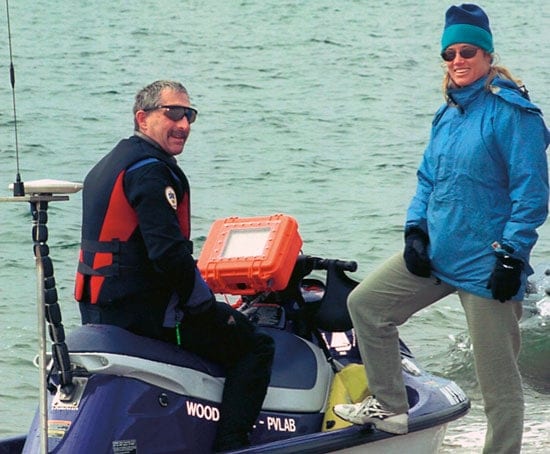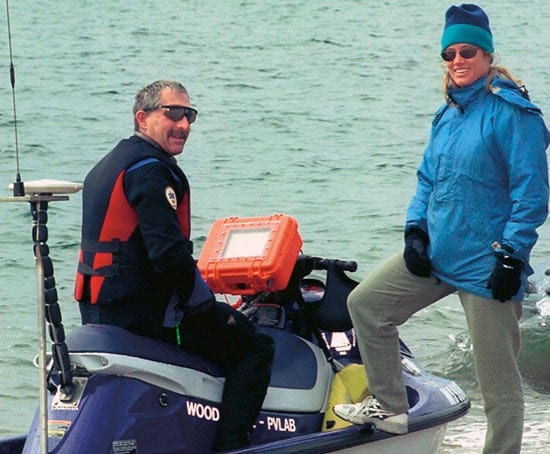Elgar Named National Security Science and Engineering Faculty Fellow
 Steve Elgar and Britt Raubenheimer refueling during a Navy-sponsored project to map the seafloor. (Woods Hole Oceanographic Institution)
Steve Elgar and Britt Raubenheimer refueling during a Navy-sponsored project to map the seafloor. (Woods Hole Oceanographic Institution) March 24, 2009
Steve Elgar, a senior scientist in the Woods Hole Oceanographic Institution (WHOI) Applied Ocean Physics and Engineering department, was recently named a 2009 National Security Science and Engineering Faculty Fellow (NSSEFF) by the Department of Defense (DoD).
Elgar, who joined the WHOI staff in 1999, is the only oceanographer in the group of eight Fellows, who were chosen from a pool of 468 nominees. Seventeen semi-finalists were interviewed by a panel of science experts and advisors who made the final selection.
NSSEFF provides grants to distinguished, top-tier faculty and scientists from U.S. universities to conduct long-term, unclassified, basic research addressing some of the most challenging technical issues underpinning the DoD. The award includes a $600,000 grant, in direct funds, each year for five years. NSSEFF fellows will be engaged with senior DoD officials, as well as scientists and engineers in DoD laboratories to share their expertise and explore potential collaborations in DoD-relevant topical areas.
“It is truly an honor for a member of our scientific staff to be included among some of the top academics in fields of strategic importance to the DoD,” said WHOI Director of Research Larry Madin.
Elgar’s study environment has been compared to working in a washing machine: he works in the surf zone, investigating how waves and currents change the shape of the seafloor in shallow water. His Fellowship-funded project includes a study of how and where rip currents are formed and how they change, which has ready implications for public safety as well as for defense interests, such as deploying troops from amphibious vehicles. Elgar and his students will investigate how waves and currents change the seafloor by dredging a gap across a sand bar to generate a rip current and by digging crater-like holes the size of swimming pools in the beach to stimulate sediment transport. After each excavation, Elgar’s team rapidly will deploy instruments and perform seafloor surveys to monitor waves, currents, and the gaps and holes as they evolve.
“The Navy has been supportive of me throughout my career, and the NSSEFF program provides me an opportunity to do something for them in return,” said Elgar, who will make several trips each year to interact with DoD research scientists in their labs. “Through this Fellowship, they are asking me to become part of the Department of Defense science enterprise — to think about problems they have and to help as best I can. That’s a really great opportunity. To spend some time thinking about their problems is really cool.”
The Woods Hole Oceanographic Institution is a private, independent organization in Falmouth, Mass., dedicated to marine research, engineering, and higher education. Established in 1930 on a recommendation from the National Academy of Sciences, its primary mission is to understand the oceans and their interaction with the Earth as a whole, and to communicate a basic understanding of the oceans’ role in the changing global environment.

